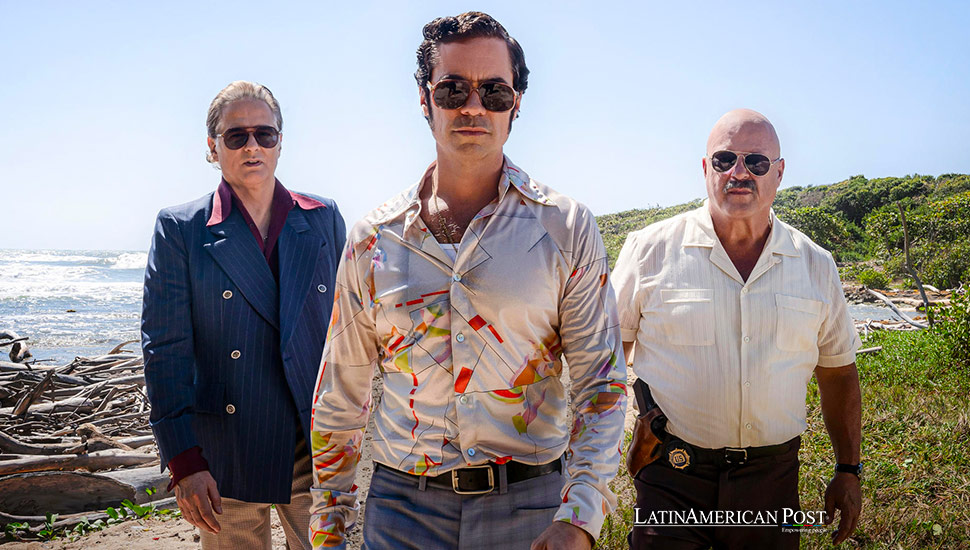‘Hotel Cocaine’ Explores 1970s Miami’s Drug Underworld Through Cuban Lens

“Hotel Cocaine,” premiering on MGM+, delves into Miami’s 1970s drug scene through the story of Roman Compte, a character inspired by the father of “Narcos” star Maurice Compte, capturing the turbulent era’s glamour and dangers.
This Sunday, “Hotel Cocaine” opens its doors on MGM+ to reveal the intricate world of drugs in 1970s Miami through the eyes of Roman Compte, portrayed by Danny Pinto. The series is based on the real-life father of Maurice Compte, a star from “Narcos.” The show takes viewers through the corridors of the Mutiny Club, an eccentric private nightclub in the exclusive Miami neighborhood of Coconut Grove. This venue was a hotspot for actors, singers, and international celebrities at the onset of the drug war in 1978.
Roman Compte manages this luxurious hotel as he tries to start a new life with his daughter and girlfriend after fleeing his past in Cuba, now under the control of guerrilla leader Fidel Castro. However, things get complicated when the DEA makes him “an offer he can’t refuse,” dragging him back into the orbit of his brother, Nestor Cabal (played by Yul Vázquez), Miami’s biggest drug lord.
From that moment, a domino effect impacts the lives of those around Compte and Cabal amidst an environment filled with disco music, wealth, glamour, and forbidden pleasures. The series portrays sex, drugs, rock and roll, and the American Dream in a vibrant and dangerous Miami setting.
A Glimpse into 1970s Miami
While “Hotel Cocaine” is a fictional drama with comedic undertones, the story of Roman Compte and the Mutiny Club has real roots. The show’s creator, Chris Brancato, also brought the successful Netflix series “Narcos” to life. The character is based on the father of actor Maurice Compte, who played Colonel Carrillo in “Narcos.” Maurice mentioned one afternoon that his father was the general manager of the extravagant hotel, inspiring Brancato to develop this story for the small screen with director Guillermo Navarro.
The actual Roman Compte passed away a few years ago, having lived a more modest life than depicted in the series. Unlike his fictional counterpart, he had no drug lord brother and never worked with authorities to infiltrate Miami’s top drug rings. These fictional elements allow the show to explore themes beyond fun, sex, drugs, and disco rock and roll, such as immigration, the Latino experience in the United States, and the pursuit of the American Dream, Brancato explains.
Adding depth to the narrative is the character of Burton (played by Mark Feuerstein), the hotel owner who embodies the 1970s’ quest for meaning and pleasure at any cost. Fun-loving and addicted to cocaine, Burton injects humor into the story, contrasting the darker elements typical of drug-centric productions.
Cuban Influence in Miami
A unique aspect of “Hotel Cocaine” is its bilingual script, written in Spanish and English, to enhance the realism and authenticity of the 1970s era and the current Miami landscape. The duality of language reflects the experience of the Cuban-American community, adding a layer of depth and credibility to the story.
Pinto and Vázquez play the fictional brothers and are Miami natives and Cuban-Americans. They felt a tremendous responsibility to bring this authenticity to the screen. “We both come from Miami, we are both Cuban-Americans, and we feel a great responsibility to portray this story with the linguistic duality that the U.S. migrant community lives with,” says Pinto.
The show’s creators aimed to authentically capture the essence of Miami’s diverse and vibrant culture, which is deeply influenced by its Cuban-American population. The struggle to balance loyalty to family with survival in a dangerous world resonates with the broader immigrant experience, highlighting the challenges and complexities many face in pursuit of a better life.
“Hotel Cocaine” is a story about Miami and a narrative that resonates deeply within the broader Latin American context. The series explores the intersection of culture, crime, and the American Dream, themes that are particularly poignant for many Latin American immigrants. The Cuban diaspora, a significant part of Miami’s identity, provides a rich backdrop for this exploration.
The show’s focus on the Latino experience in the United States, particularly during the turbulent 1970s, offers a lens through which viewers can understand the broader implications of immigration and cultural assimilation. Roman Compte, with his Cuban roots and American aspirations, embodies the dual identity that many Latino immigrants navigate daily.
In addition to its historical and cultural insights, “Hotel Cocaine” offers a fresh take on the genre of drug-related dramas. By incorporating humor and personal struggle elements, the series distinguishes itself from other productions focused solely on the crime aspect. This approach broadens its appeal, making it relevant not only to those interested in the history of Miami’s drug trade but also to viewers who appreciate character-driven stories that explore deeper social issues.
A Tale of Survival and Transformation
“Hotel Cocaine” is more than just a crime drama; it is a story of survival, transformation, and pursuing dreams against the odds. The series captures a pivotal moment in Miami’s history, bringing to life the vibrant and chaotic world of the 1970s drug scene. Through the lens of Roman Compte’s journey, the show explores themes of family, loyalty, and the quest for a better life, resonating with audiences far beyond Miami.
The premiere of “Hotel Cocaine” on MGM+ promises to offer a compelling and nuanced portrayal of a critical era in Miami’s history. With its rich characters, authentic setting, and bilingual narrative, the series significantly contributes to the genre. It entertains and educates viewers about the cultural and historical context of Miami’s Cuban-American community and its impact on the city’s evolution.
Also read: U.S. Condemns Cuba’s Protest Sentences Amid Own Crackdowns
As viewers tune in to “Hotel Cocaine,” they will embark on a journey that is as thrilling as it is thought-provoking, reflecting the complexities and challenges of the immigrant experience. This series is a testament to the power of storytelling in bridging cultures and shedding light on the multifaceted reality of life in pursuit of the American Dream.




